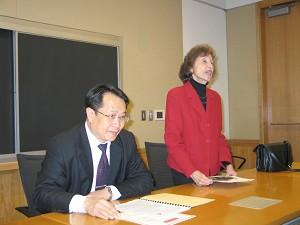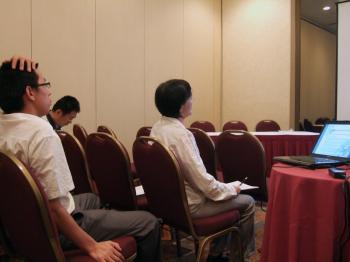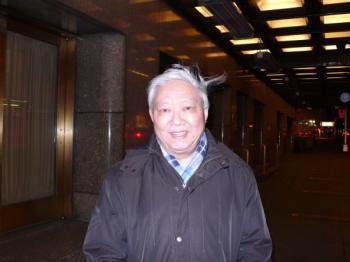CONNETICUT – On October 10 Mr. Mo Shaoping, a renowned human rights lawyer who has defended many political dissidents in China, gave a lecture at Yale Law School, titled “The Abuses in the Implementation of Laws in China.” Over 50 people listened to his lecture; most of them were Chinese students. The audience respectfully raised many questions and Mo’s humorous answers lightened the discussions on serious topics.
The Eight Great Difficulties of a Criminal Lawyer in China
Mo Shaoping first presented some statistics about criminal lawyers in China. From 1997 to 2002, 500 lawyers were arrested in China for working on criminal cases and less than 30 percent of all criminal cases have defense lawyers in court. There are two factors that have led to this situation, which are inconceivable to an American audience: 1) China does not have an independent legislative system and 2) China does not have a mature bar system. There are eight great difficulties for a criminal lawyer in China:
The Difficulty in Meeting the Litigant
The public security organizations arrange the time and place for a lawyer to meet the litigant. They are also present during the meeting and can interrupt at any time.
The Difficulty in Obtaining Documents
The prosecution decides which documents are to be delivered to court as evidence. The lawyers can only see documents permitted by the prosecution.
The Difficulty in Investigating and Obtaining Evidence
Chinese lawyers have little authority to carry out any investigation. They face many limitations when collecting materials, such as having to obtain permission from the procurator, the court and witnesses.
The Difficulty in Bringing Witnesses to Court
In China 94 to 96 percent of criminal cases do not have witnesses in court. The prosecutor only submits the witness’ statement, but the lawyer may not question the witness in person.
The Difficulty in Obtaining Immunity
The fifth difficulty is that Chinese lawyers do not have immunity. Article 306 of the Criminal Law of the People’s Republic of China (The Criminal Law of China) is about the “Lawyer’s Crime of Felony.”
The Difficulty in Remaining Silent
The Criminal Law of China does not protect the right to remain silent. It states that the litigant must answer all questions from the prosecution. It is therefore very popular for Chinese police to force confessions by torture.
The Difficulty of Completing Cases on Time
The Chinese bail system is far from complete. Many cases cannot be processed within the planned time and are backlogged.
The Difficulty of Balancing the Power of Certain Organizations
The Criminal Law of China also grants power to certain organizations without appropriate checks and balances. As a result human rights-related cases could involve “state secrets,” decided on the whim of the State Secrecy Bureau, which has the power to define such things. These add further difficulties to the job of the criminal lawyer.
The CCP Regime is the Core of the Malpractices
When asked about the recent amendment to the Criminal Procedure Law in the People’s Congress to incorporate “the Right to Remain Silent” and “the Immunity of Lawyers” in the law, Mo Shaoping said, “The chief judge of China’s Supreme Court Xiao Qiang emphasized the strengthening of the CCP’s leadership over China’s legislative system and that its role is forever cemented.” As long as China’s legislation is not independent, amendments to the articles will not solve the fundamental issues.
Mo Shaoping said, “Article 126 of The Law of China states that the court independently decides sentencing without reporting to administrative, social, or personal organizations. However, it is not independent from the CCP, the military, or the enterprises. This allows the CCP to control the legislative system—‘The one who holds the trial can not decide the sentence, and the one who issues the sentence does not conduct the trial.’ The judges hearing the trials do not have the authority to issue sentences; they have to report to a committee, whose members were not present at the trial, for a decision. Important cases are decided by the CCP Party Secretary and the Political and Law Committee. At the local level, it is said the CCP controls the positions, the government controls the budget, and the political and law committee is in charge of the cases.
History will Judge if It is Right or Wrong
Many questions from the audience were on the differences between Chinese and western laws and how to amalgamate them. Mo Shaoping emphasized that it is related to the issue of values. One question was: “How to protect people with the amendment to the law to grant ”the right to remain silent“, as certain cases would not be resolved without forced confession.” Mo Shaoping said that he'd rather set a criminal free than punish innocent people. A criminal will be brought to justice sooner or later.
When asked about the CCP labeling as an “illegal activity” the ability to let Chinese people know the truth by breaking through internet blockades and sabotaging satellite TV transmissions, Mo Shaoping said, “It is also related to value orientation. I can only say that this law is itself vicious and illegal.”
Mo Shaoping revealed that on his journey to fight for the rights of political dissidents, he was threatened by prosecutors, his telephone conversations were bugged, and he was monitored. However, he accepted these risks and took on the very public human rights cases. Mo Shaoping said that the law cannot be validated if lawyers do not uphold these values. He said, “In my opinion, history will judge the right or wrong of what is happening now.”


